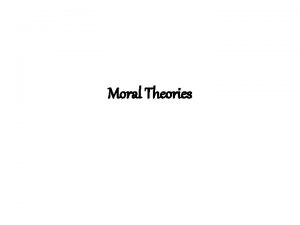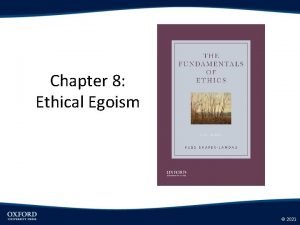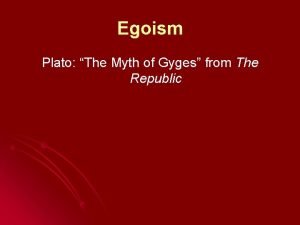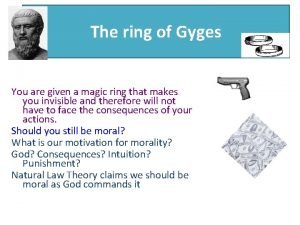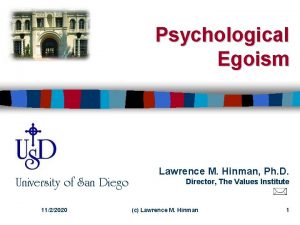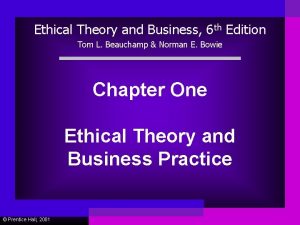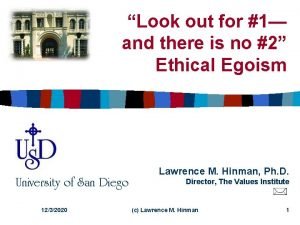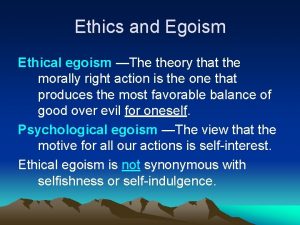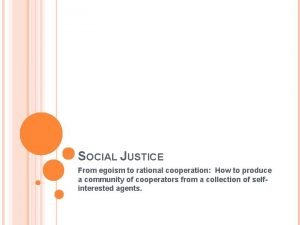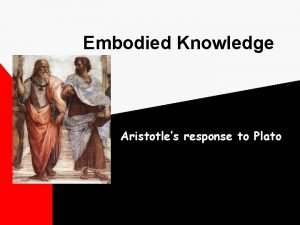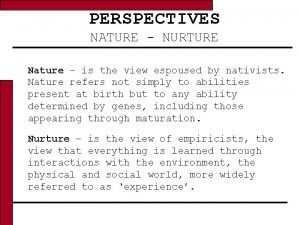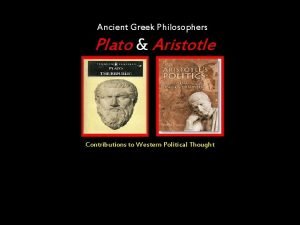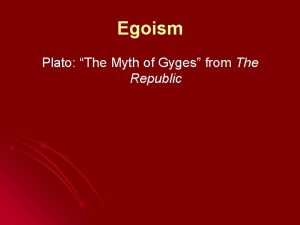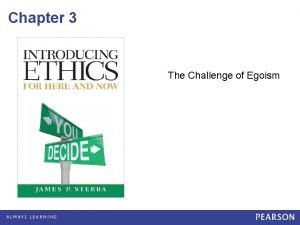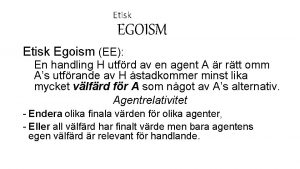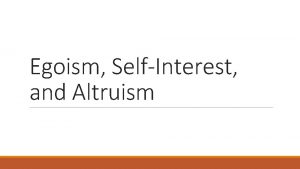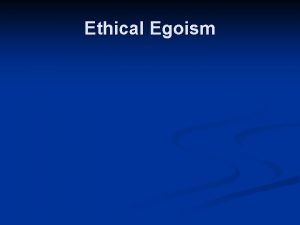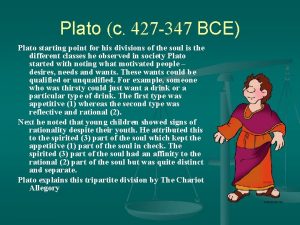Egoism Plato The Myth of Gyges from The



















- Slides: 19

Egoism Plato: “The Myth of Gyges” from The Republic

Glaucon – the case against being just. l l Morality is a necessary evil. If we had the power to do whatever we liked without fear of punishment, we would not act morally. The just man is not essentially different than the unjust man. Both the just and the unjust man would act the same given the chance.

Glaucon Argument(continued) Being just is not as important as appearing just. l Attaining justice is fraught with difficulty. It is easy and rewarding to be unjust. l Challenge presented to Socrates in the dialogue – isn’t it better to be an unjust man rather than a just one. l

Psychological Egoism Psychological egoism is as much a theory about who we are as human beings as it is a theory of how we ought to act. It is an attempt to give one simple explanation of human motivation and behavior. l Psychological Egoism: theory that every human action is motivated by selfinterest. l

Psych. Egoism (continued) To state that individuals are driven by selfinterest is not to prove it to be the case. l Basic Test: take any virtue or apparently selfless act, and see if it is possible to reinterpret in terms of self-interest. l Problem: that fact that such a reinterpretation is possible does not make it true. l

The Case for Psychological Egoism Argument 1: We always do what we most want to do. l Response 1: It is clearly false that we only do things that we want to do. l

Argument 2: We do only that which makes us feel good. All so-called un-selfish acts produce a feeling of self-satisfaction, and this is the actual reason why we engage in the unselfish act. l Response 1: Deriving satisfaction ≠ acting selfishly. l

Response 2: Why would someone derive satisfaction from helping others? l Answer: You are the kind of person who cares about what happens to others. If you were doing action for personal prestige, you would not derive satisfaction from the action – but it is already assumed that you are deriving satisfaction from the action. l

General confusions by advocate of psychological egoism. As has been mentioned self-interest ≠ selfish l Self-interested behavior ≠ pleasurable behavior l Concern for ones well-being is incompatible with a concern for others. l

Attraction of Psychological Egoism Theoretical simplicity (note: common in economic theory) l Psychological egoism is irrefutable. l Problem: Its strength is also its weakness. It lacks the general principle of being falsifiable (un-testable). Once it is accepted that everyone acts from selfinterest, every action can be interpreted as self-interested. l

Ethical Egoism l l l Underlying assumption of most morality: we have “natural” duties to help others simply because they are people who could be helped or harmed by what we do. Ethical egoism holds that we have no natural duties to others. Ethical egoism: the normative ethical theory that holds that each person ought to pursue his or her own self-interest. Our only duty is our duty to ourselves.

What ethical egoism does not claim l Does not require that we consider our interests and the interests of others. l Does not say that we should avoid helping others. l Does not imply that pursuing our interests is always what we want to do.

Egoism vs. Altruism l Altruism is self-defeating l We know our own needs well, but we only know the needs of others imperfectly. l Looking out for others is an intrusion of people’s privacy. l “Charity” is degrading to others.

Egoism vs. Altruism (2) l Argument against altruism: 1)We ought to do what promotes everyone’s interests 2) Best way to promote everyone’s interests is to act as an egoist 3)Therefore, We should each pursue our interests exclusively

Ayn Rand’s Argument (3) l To value the individual, we cannot expect them to sacrifice it for others. 1) A person’s life is of supreme importance 2) Altruism regards the life of the individual as something one must be ready to sacrifice for others. 3) Therefore, altruism does not take seriously the value of the human individual. 4) Ethical egoism allows each person to value his or her own life as being of ultimate value. 5) Therefore, ethical egoism is the philosophy we ought to accept.

Response to Rand’s Argument False dichotomy – individual life has all value (egoism) or individual life has no value (altruism). l We do not have to hold exclusively to one extreme or the other-can hold a position in -between. l

Positive Argument for Egoism Ethical Egoism is compatible with common -sense morality: ethical egoism is a way of organizing a number of moral principles (simplifying principle akin to a scientific theory e=mc 2. l Response: 1) At best E. E. proves that it is usually or mostly to one’s advantage to follow certain moral principles, 2) Does not really prove that the only or most basic reason for doing something is egoism l

External Criticism of Ethical Egoism justifies what we take to be wicked acts. -Not an objection the egoist will find compelling. -Egoist is not concerned with justifying our current moral intuitions.

Internal Criticism of the Theory l Cannot handle conflicts of interest -Egoist Response: Only troubling if we believe that ethics must resolve conflicts such that all can live together harmoniously. l Ethical egoism is unacceptably arbitrary. l Me vs. everyone else.
 Example of hypothetical imperative
Example of hypothetical imperative Ethical egoism
Ethical egoism Ethical egoism definition
Ethical egoism definition Ring of gyges moral lesson
Ring of gyges moral lesson Secondary precepts examples
Secondary precepts examples Gyges greek mythology
Gyges greek mythology Secondary precepts list
Secondary precepts list Gyges ring ro
Gyges ring ro Egoism
Egoism Psychological hedonism
Psychological hedonism Psychological egoism examples
Psychological egoism examples Nietzsche egoism
Nietzsche egoism Ayn rand ethical egoism
Ayn rand ethical egoism Rational egoism
Rational egoism Differences of plato and aristotle
Differences of plato and aristotle What is nurture in psychology
What is nurture in psychology Vocabulario de jugo
Vocabulario de jugo Socrates plato and aristotle worksheet answer key
Socrates plato and aristotle worksheet answer key Platos aesthetics
Platos aesthetics Plato (427-347 sm)
Plato (427-347 sm)
